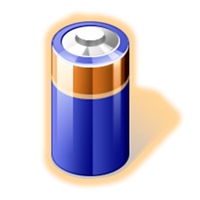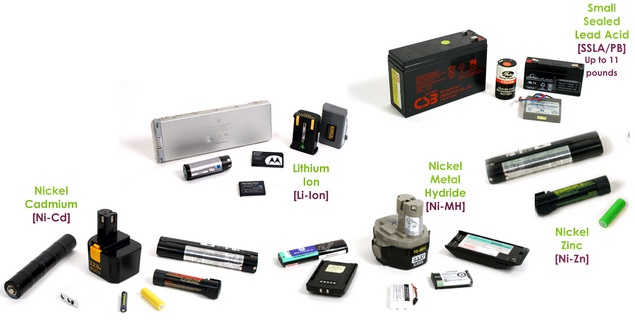Battery Info
Summary of Battery Buying and Disposal Best Practices: 
- Most household batteries may be disposed of in the regular garbage.
- If you purchase 12 or more batteries a year, rechargeable batteries will save you money.
- Few button batteries still contain mercury but if you have an older one, it may be taken to a Household Hazardous Waste Collection.
- Rechargeable batteries contain heavy metals and must be recycled at special collection sites. (spent lithium batteries should be taped on ends when held in storage)
- NEVER place any batteries in a recycling cart
Will County Partners for Rechargeable Battery Recycling:
- Braidwood's Fossil Ridge Library (sicne 2015)
- Crete Library (since 2015)
- Manhattan-Elwood Public Library

- Mokena Library
- New Lenox Public Library (since 2023)
- New Lenox Township (since 2023)
- Peotone Public Library (since Sept. 2015)
- Plainfield Public Library
- Three Rivers Public Library District (since 2015)
- Will County Land Use Office in Joliet
- White Oak Library District - Crest Hill location (since Sept. 2016)
- Will County accepts rechargeable and button batteries at Household Hazardous Waste Collections.
Will County Retail Partners for Rechargeable Batteries:
- Batteries Plus
- Best Buy
- Home Depot
- Interstate Batteries (and all button batteries)
- Lowes
- Verizon
- Call The Rechargeable Battery Recycling Corporation (Call2Recycle), at 1-877-723-1297 or visit www.call2recycle.org
Retailers accepting spent or unwanted Lead-acid Batteries include:
- Batteries Plus
- Interstate Battery
- O'Reilly Auto Parts
- Napa Auto Parts
- Advance Auto Parts
Tips for Choosing a Battery
- If you purchase more than 12 batteries a year, switching to rechargeable batteries will save money and resources. Money will be saved because you are not replacing batteries, and not throwing out old batteries, means less batteries in area landfills. NiCd rechargeables are made from nickel and cadmium, these batteries usually last many years and are commonly best used in low-to-moderate discharge devices such as scanners, portable radios, cordless phones and power tools. These batteries require special handling at the end of their lifetimes. All retailers of NiCad Batteries accept these batteries for recycling through RBRC (Rechargeable Battery Recycling Corporation).
- Similarly, the Nickel-Metal Hydride batteries (NiMH)are also available in standard cylindrical sizes and differ from NiCads in their higher memory capacity and better recharge ability. Commonly they are used in digital cameras, laptops and cell phones.
- Lithium-Ion batteries are rechargeable and easily recycled through RBRC’s retail network. Lithium-ion battery terminals (positive and negative connections) must be covered by tape and stored in a cool area prior to recycling. Lithium-ion batteries have been known to overheat and therefore cause fires at recycling and garbage facilities due to uncovered terminals and mishandling. Always tape the ends of these batteries when storing for drop-off only recycling.
- Single use Lithium batteries are made with metallic lithium and need to be kept separate from recycling. Similar to Lithium ion batteries, single use Lithium batteries have also been known to overheat on rare occasions, so store in a cool area with tape on the ends.
- Alkaline batteries are the most common type of batteries. The premium version of alkaline manganese batteries are designed for high energy draining devices such as digital cameras and CD players. Manufacturers have been working to remove mercury from these batteries for decades and currently all types are either mercury-free or have an extremely low-mercury content. These batteries have basically replaced zinc-carbon and zinc-chloride batteries, which do not perform nearly as well. The EPA does not recognize these batteries as hazardous. They are also very difficult to recycle, so alkalines and zinc-based batteries should be sent to a landfill.
- Very old button batteries or silver oxide batteries, may still contain mercury. They are commonly used in hearing aids, watches and some cameras. These should always be recycled.
- Nearly everyone relies on lead-acid batteries. They are used in cars, boats, lawn equipment and more. Made of lead and containing acid, these batteries are banned from landfills. These batteries are accepted by some retail outlets when new batteries are purchased. They are also accepted at most scrap metal recyclers and some retail outlets when no purchase is being made. If you have a spare lead-acid battery, keep it stored in a cool, dry place until it can be taken to a recycler or appropriate retailer.
Still concerned about alkaline batteries? Click
here to see the results of a study of their components.
More information on the challenges of Battery Recycling is available in an article on
Earth911.org.
Illinois Passes Battery Stewardship Act
In 2024 Will County supported efforts to pass legislation requiring manufacturers of batteries to fund battery collection for both single-use and rechcageable batteries throughout the State of Illinois. The legislation was passed and signed into law. Manufacurers must submit a plan to the Illinois EPA in 2025. This law is expected to result in hundreds of collection sites opening in retail and other locations in late 2025 or early 2026 improving convenience, safety and efficiency.
Vermont was the first state to require all batteries to be collected for recycling. See an article on the effort, set to start in 2016: http://www.call2recycle.org/leading-battery-companies-select-call2recycle-to-manage-nations-first-single-use-battery-recycling-program-in-vermont/
Click Here to download Will County's 2015 Battery Brochure in PDF form